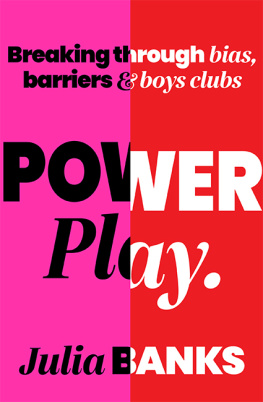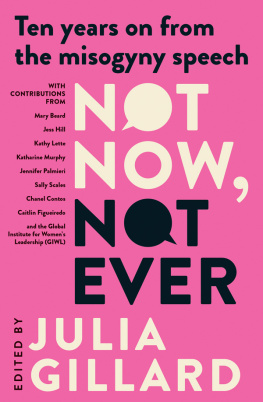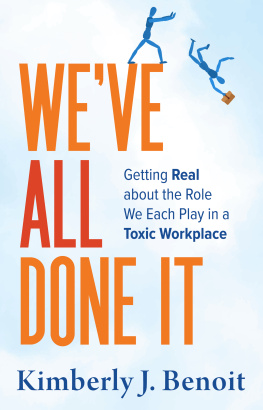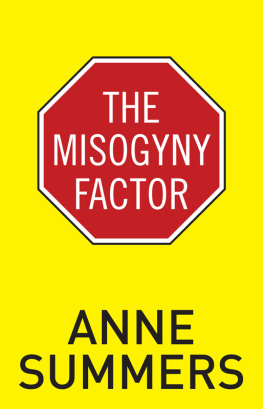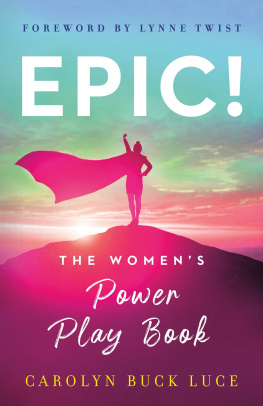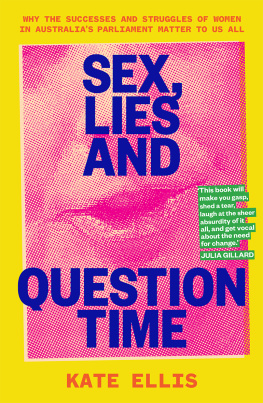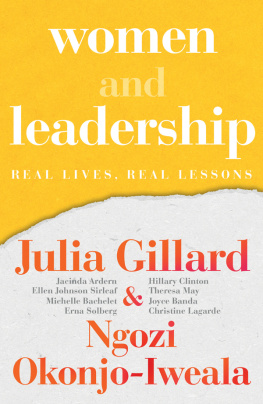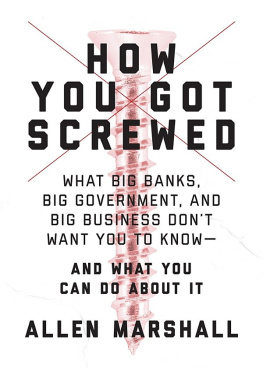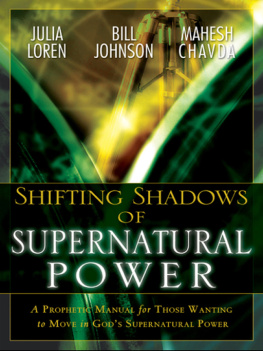
To my beloved mum my first role model.
To my husband my great life love; and to our son and daughter who fill my heart with unconditional love.
Often when good women call out or are subjected to bad behaviour, the reprisals, backlash and commentary portrays them as the bad ones: the liar, the troublemaker, the emotionally unstable or weak, or someone who should be silenced.
Julia Banks, Australian House of Representatives, 27 November 2018
W hos going to look after your kids? The question was put to me abruptly and unashamedly, the interviewers tone aggressive. Youll be constantly travelling and away for work.
I was taken aback, but I remained Zen-like as I replied. My kids have grown up with both their parents working. Theyre self-sufficient, older and
Exactly how old are they? The interviewer impatiently interrupted. She fired her questions down the phone like bullets, demanding efficient replies.
Still somewhat Zen-like, I replied, In their late teens.
Good God, how old are you then? she asked.
Zen switched to incredulity. Am I really being asked this question? But I answered, Fifty-two.
Well then, youre too old. And with that, the conversation concluded.
I am sure this experience would not have been all that surprising to women who started in the workforce in the 1970s and 80s or even the 90s. During one of my first job interviews, as a young, newly qualified lawyer, the HR guy had said, Mmm, well, Im not supposed to ask this question, but you are a young woman of childbearing age: how are you going to cope with a full-time job if you go off and have babies? The introduction of the Sex Discrimination Act in 1984 had still been a work in progress as far as that guy was concerned. Again, in the early 1990s, my nervous excitement had turned to disbelief when a bank manager said that his bank (one of the big four) would only give us a loan based on my soon-to-be husbands income, not mine because I would likely give up work and have children.
But this conversation wasnt taking place in the 1980s or 90s. This was 2015. That year, when the newly installed prime minister of Canada, Justin Trudeau, was asked to explain his gender parity promise of an equal number of men and women in his cabinet he had said simply, Because its 2015.
Granted, this was a job interview with a difference: it was one among a series of phone conversations and coffee meetings to be completed by anyone contemplating or seeking preselection to be a candidate in a federal election for a major political party.
Like most women, I have many stories that pertain to gender inequality, but this one was a standout not least because it was 2015. It was one of those exchanges you have that leaves you feeling rattled and uneasy. I got up from my desk, went outside to get some air and phoned a friend. You wouldnt believe the conversation I just had At times like these, the sisterhood is still what you draw on.
If you tick one or some of the boxes, discrimination, barriers, misogyny and bias come with the territory, and throughout my career I ticked most of the boxes at one time or another. Woman tick. Young woman tick. Forty-something woman tick. Fifty-something woman tick. Single woman tick. Married woman tick. Full-time worker and mother of two tick. Woman of non-Anglo-Saxon heritage tick. Older woman tick.
None of this stopped me playing the game day after day.
Im also short and small in stature, for which no high heel can compensate. Petite, say my friends. Small but power-packed, said a work colleague.
In a world where the other players were all men, my physical size and strength put me at a disadvantage in some forms of the game. The field of play: the boardroom. The opening tactic: the handshake. I once found myself surreptitiously stretching my hand backwards and forwards thinking, God that hurt. Play continued, with everyone taking their strategic positions around the enormous boardroom table. Every other person was an older, white male, except for one younger man who had compensated by ramping up his handshake methodology from firm to ridiculous. (One of my older male colleagues confirmed the strategy as just a power thing that younger handshake assaulter was hoping to subliminally assert himself a little more.) No doubt most, if not all, of the men sitting around that table had similar lived experiences, which meant similar values, tactics and skills were the name of this game. They all intuitively understood the same power plays from the opening handshake to the negotiation styles that were played across the table.
Throughout my career I have always worked in blokey cultures. The makeup of people around these boardroom tables is slowly changing but slowly is the operative word. Not fast enough is the reality. The business case has been made time and again that diversity delivers success in terms of profit and workplace culture, and yet all too often it feels like this information is falling on deaf ears.
I dont believe that effective leadership traits are gendered. Rather, good traits are weighted differently based on different lived experiences. Throughout history, many older white males have been great leaders, led successful businesses and governments, and empowered future successful leaders. Many I have worked with. The best leaders have encompassed compassion and empathy in their style, be that for their employees, their stakeholders, their citizens or their customers. But lived experiences of people of different genders, different ages, different cultural backgrounds, sexualities and abilities all shape leadership styles and create different voices all of which need to be seen and heard if we are to make a world where all people are represented and treated equally.
Still, it remains as true today as it did years ago that cultural prejudice, ageism and sexism all lurk, overlap and intersect in the corridors of power and in all workplace cultures. Sometimes, these forces remain unseen covered up or hidden in unconscious parts of the mind only surfacing from time to time in unexamined speech or action. Other times they are part of a pattern, occurring so regularly that they might feel mundane and innocuous. Either way, these forces create roadblocks that thwart peoples leadership journeys.
Our society be it parliament or workplace, the school playground or the sporting arena is structured on power. Power in all its glorious and inglorious forms. Power for good and for bad. Power used to make a difference and power used to keep things the same. The power of financial and personal independence and the power of silence or being silenced. Unspoken, historical and structural rules around power. Power used to amplify the voices of others. The possibilities when power intersects with courage and the gift of time.
Positions of power arent confined to the office held, the title or to politics. Power doesnt just manifest itself in overtly powerful positions, and its not limited to institutional power. It includes the power of the team as much as it does the personal power of the individual. Power in all its forms is everywhere in the workplace. It is in the public and private sector in equal measure. It is in the corporate sector, the legal and medical professions, and in academia. It is in local councils and small to medium business. It is in sport, the arts and the media.
But the fact is, there are more men than women holding this power. Men have more power over our society, our economy, and our future.
Sometimes the family structure you grow up in can be your first experience of bias and barriers. But its often when people start work, even in a casual after-school job, that they discover these biased forces at play. Entering the workplace is metaphorically and physically like entering a new building. Its a new structure. And within it there are hierarchies. There are the more senior players, the more experienced players, the good players, the bad players, the weak and the strong, the coaches, the support staff, the cheats, the bullies and the mentors. Theyre all there. Entering this workplace structure often coincides with a time when people are harnessing or establishing their own sense of self and purpose and figuring out whats important to them. They may incorporate these existing structures of power into their own self-image and learn how to work within them. Or they may choose to resist them, try to change them or walk away from them.
Next page
